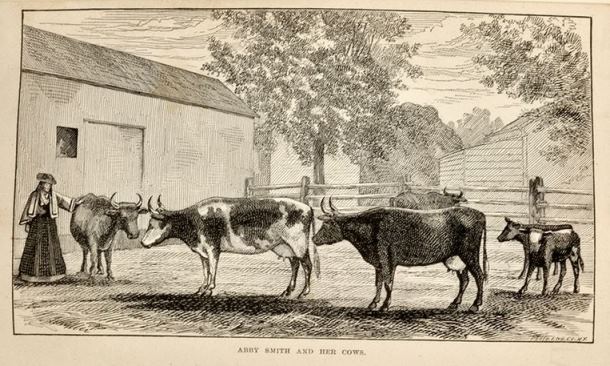Today in 1879, Abigail “Abby” Hadassah Smith, — who achieved instant national fame at age 76 because of the way she responded to the man who took her cows — passed away at her home in Glastonbury.

Born into a prominent activist Glastonbury family, Smith and her four sisters were educated from birth to fight for what they believed in. While pursuing individual accomplishments ranging from blacksmithing to painting to Biblical translation, the Smith sisters, who never married, collectively dedicated their young lives to the cause of abolishing slavery. That goal took many decades and a Civil War. By then, the Smith sisters were no longer young, nor five in number. Still, undaunted by advancing years, the remaining Smith sisters, Abby and her sister Julia, joined the cause of securing women the right to vote.
At ages 79 and 72 respectively, Abby and Julia attended Isabella Beecher Hooker’s 1869 conference in Hartford and helped form the Connecticut Woman Suffrage Association. But it wasn’t until four years later that, thanks to Glastonbury’s tax collector, Abby achieved nearly instantaneous national fame as an advocate for women’s rights.
In November 1873, Glastonbury’s assessor increased the taxes on Kimberly Mansion, the family home the sisters had inherited. He also increased the taxes on the property of two other town women who were widows. No home owned by a man, however, saw a similar increase. Abby and Julia were incensed. “It increased our tax but little,” Abby wrote, “but what is unjust in least is unjust in much.” Abby put her indignation in writing, composing a speech she delivered to the next town meeting,
“The motto of our government,”she declared,”is ‘proclaim liberty to all the inhabitants of the land,’ and here, where liberty is so highly extolled and glorified by every man in it, one half of the inhabitants are not under the law, but are ruled by the other half, who can . . . take all they possess. How is Liberty pleased with such worship. . . ? All we ask of the town ,” she concluded.”is . . . to be on an equality with them.”
Abby and Julia refused to pay their taxes. That’s when the tax collector made Abby famous. Rather than offering to postpone payment by charging interest, as was the normal procedure, he seized seven of Abby’s prized Alderney cows to auction off to cover the tax bill. The cows, which had been raised almost as pets, were led away quite unwillingly, and thereafter, refused to be milked unless one of the sisters was standing nearby.
On a cold January 8, 1874, the seven cows were led by the tax collector, accompanied by four men and a drum, through the streets of Glastonbury to the auction block. Behind them came some 40 local residents ready to bid, and behind them, bonneted-heads held high, the two Smith sisters. Prim but insistent bidders, the women used their funds to reclaim four of the beloved cows.

Up the river from Glastonbury, the editor of the Springfield, Massachusetts Republican heard of Abby’s tax protest and the auction. He recognized a good story when he saw one, and ran a sympathetic, patriotic account of Abby’s skirmish with the tax collector, reprinting her entire speech in full. “Abby Smith and her sister as truly stand for the American principle as did the citizens who ripped open the tea chests in Boston Harbor, or the farmers who leveled their muskets at Concord,” he wrote. He started a defense fund for the sisters (the first GoFundMe account?) urging readers to contribute. The story spread like wildfire. Papers and magazines across the nation ran the account, and overnight, Abby Smith and her cows became national celebrities and icons of feminine patriotism. Money and encouragement poured in.
 This new-found fame was further advanced the following June, when the tax collector seized 15 acres of the sisters’ land and sold it immediately and surreptitiously, preventing them from reclaiming it. Abby and Julia sued to get the land back, and the whole country followed the courtroom saga of “Abby and Her Cows” for the next two years. When, in November, 1876, the final verdict came down in Abby and her sister’s favor, fans across the nation rejoiced in their victory.
This new-found fame was further advanced the following June, when the tax collector seized 15 acres of the sisters’ land and sold it immediately and surreptitiously, preventing them from reclaiming it. Abby and Julia sued to get the land back, and the whole country followed the courtroom saga of “Abby and Her Cows” for the next two years. When, in November, 1876, the final verdict came down in Abby and her sister’s favor, fans across the nation rejoiced in their victory.
Invitations to national suffrage conventions, a Senate hearing, and a meeting with the President accompanied the sisters’ instant celebrity, and in 1877, Julia gathered Abby’s speeches and letters into a volume simply titled Abby Smith and Her Cows. When Abby Smith died – today in 1878 at age 82, Isabella Beecher Hooker said, “Abby Smith and her cows are marching on like John Brown’s soul.” A taxing encounter with local authorities had truly been milked for all it was worth.
Further Reading
Elizabeth G. Speare, “Abby, Julia, and the Cows,” American Heritage
Molly May, “The Smith Sisters, Their Cows, and Women’s Rights in Glastonbury,” connecticuthistory.org
“Abby Hadassah Smith and Julia Evelina Smith, American suffragists,” Encyclopedia Brittannica

